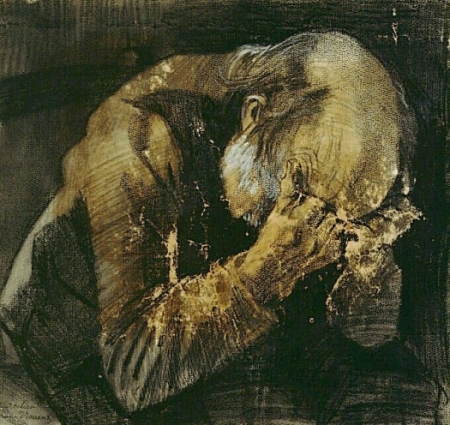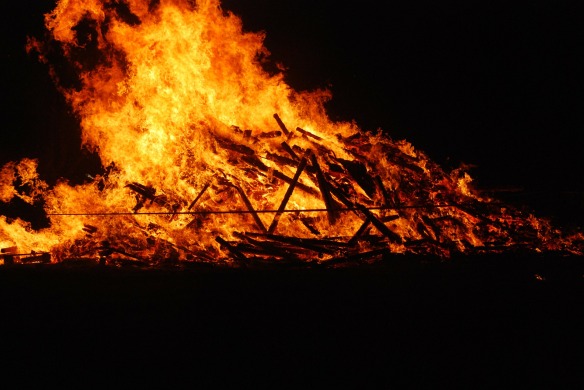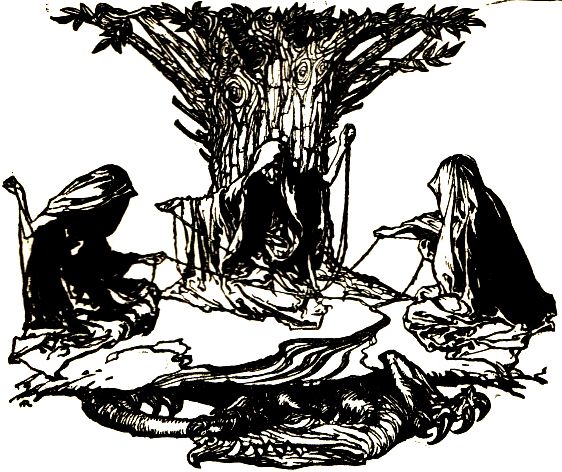Recap
Synopsis
The Original Old English
My Translation
A Quick Interpretation
Closing

An Anglo-Saxon dragon, complete with treasure hoard. Image from http://brer-powerofbabel.blogspot.ca/2011_09_01_archive.html
Back To Top
Recap
Last week, Beowulf recounted how Hygelac rewarded him for his role in the war with the Swedes. And I wondered about Beowulf’s timeline.
Back To Top
Synopsis
Beowulf now boasts to boost his spirits.
Back To Top
The Original Old English
“Beowulf maðelode, beotwordum spræc
niehstan siðe: ‘Ic geneðde fela
guða on geogoðe; gyt ic wylle,
frod folces weard, fæhðe secan,
mærðu fremman, gif mec se mansceaða
of eorðsele ut geseceð.’
Gegrette ða gumena gehwylcne,
hwate helmberend, hindeman siðe,
swæse gesiðas: ‘Nolde ic sweord beran,
wæpen to wyrme, gif ic wiste hu
wið ðam aglæcean elles meahte
gylpe wiðgripan, swa ic gio wið Grendle dyde.
Ac ic ðær heaðufyres hates wene,
oreðes ond attres; forðon ic me on hafu
bord ond byrnan. Nelle ic beorges weard
forfleon fotes trem, ac unc furður sceal
weorðan æt wealle, swa unc wyrd geteoð,
metod manna gehwæs. Ic eom on mode from
þæt ic wið þone guðflogan gylp ofersitte.
Gebide ge on beorge byrnum werede,
secgas on searwum, hwæðer sel mæge
æfter wælræse wunde gedygan
uncer twega. Nis þæt eower sið
ne gemet mannes, nefne min anes,
þæt he wið aglæcean eofoðo dæle,
eorlscype efne. Ic mid elne sceall
gold gegangan, oððe guð nimeð,
feorhbealu frecne, frean eowerne!'”
(Beowulf ll.2510-2537)
Back To Top
My Translation
“Beowulf spoke after a pause, made a formal boast
for the final time. ‘In youth I
risked much in combat, yet I will once more.
Though I am now an old king of the people, I shall pursue this feud,
gain glory, if only the fiend to men
will come out from his earth-hall to face me!’
Addressed he then each warrior,
speaking true to each helm-wearer, for the last time,
every gathered dear companion: ‘I would not bear a sword,
bring the weapon to the wyrm, if I knew how
I might otherwise grapple gallantly against
that foe, as I once with Grendel did.
But there will be hot war-fires I expect,
stinking breath and venom. Thus I have on
both shield and byrnie. And I will not give
a foot’s length when I meet the barrow’s guard, but between us two
what is to happen later on the sea-wall, that is as fate.
The Measurer of Men is indeed to decide. I am firm of heart,
so that I may desist from boasting over this war-flyer.
Wait you all on the barrow, my armed men,
warriors ready in war-gear, while we see which
of we two can endure the wounds
after our deadly onslaught. This is not your fight,
nor any other man’s, but mine alone
to share my might with the foe,
indeed, to share my courage. By that courage shall
I win the gold, or, in this battle, gain the peril of a violent death,
if the latter, may your lord to swept away!’”
(Beowulf ll.2510-2537)
Back To Top
A Quick Interpretation
I can see Beowulf screaming down to the barrow as he wraps up his boast, and I can see him maybe bashing his shield and sword together as he speaks to the Geats (and the thief!) he has with him, imploring them to stay put.
What’s most surprising and gripping about this passage, though, is Beowulf’s apparent foreknowledge of what is to happen. He doesn’t get specific but his saying “but between us two/what is to happen later on the sea-wall, that is as fate” (“ac unc furður sceal/weorðan æt wealle, swa unc wyrd geteoð” (ll.2525-2526)) strikes me as a bit of insight into his own end.
And honestly, that sentiment seems to colour this whole passage.
Beowulf definitely knows how dangerous this fight will be. And he seems to bar the others from joining him because he wants to expose only himself to what will surely be a fatal encounter. I mean, he also wants to get all the glory (hello there, fatal flaw), but I definitely get the impression there are a few drops of compassion for his fellow Geats in the mix, too.
How much of his future do you think Beowulf is aware of? Is he just predicting that he’ll end up fighting the dragon on an outcropping close to the nearby sea? Or is there more insight there?
Feel free to share your theories in the comments!
Back To Top
Closing
Next week, Beowulf sets out to meet the dragon.
If you enjoyed this post, please give it a like. And, if you want to keep up with my translations, please do follow this blog!
You can find the next part of Beowulf here.



